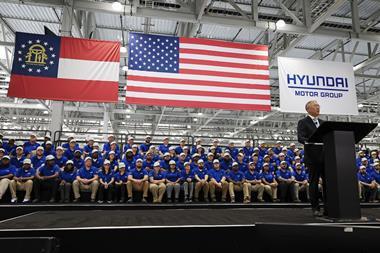
Logistics providers Autohub and Pentalver have joined with international inspection company JEVIC to launch the UK’s first vehicle pre-clearance facility for used car shipments to New Zealand. The move is in response to an increase in second hand exports to the country from the UK (which both use right-hand drive vehicles), with numbers set to double over the coming year.
A spokesperson for the venture said the second-hand used car export market to New Zealand was worth £160m per year.
The joint venture’s new 225-metre-square facility has been purpose-built at Pentalver’s Felixtowe depot in the UK and offers 1,700 square-metres of storage space, enough for 140 vehicles awaiting inspection. Post inspection the vehicles are driven directly into Pentalver NOR containers for storage. Pentalver is one of the largest inland container logistics companies in the UK.
The inspection service at the facility involves a biosecurity contamination check, in line with the New Zealand government’s stringent regulations, as well as a structural inspection made on behalf of the New Zealand Transport Agency.
Once containerized, the vehicles are shipped out from the port of Felixstowe by Maersk.
“Vehicles can be prepared and shipped in as little as four days,” said a spokesperson for the venture. “Where the real time saving arises is upon arrival in New Zealand as the car doesn’t have to sit at the port awaiting inspection; it can go directly to final delivery point.”
In 2011, exports of used cars from the UK to New Zealand saw a significant rise with an average of 200 cars per month by the end of last year.
“We expect this trend to continue with monthly export numbers set to more than double over the coming year,” said the company spokesperson.
Autohub’s managing director, John Davies, said the new facility has the capacity to process 30,000 cars per year.
This increase in used car exports is influenced by a tightening of emissions regulations for new and used vehicles entering New Zealand, something set to continue with mandatory Euro 5 emissions compliance proposed to come into effect by 2016.
The joint venture said in a statement that current domestic market vehicles in Japan are not produced to Euro 5 or equivalent standard and there could be a substantial shortfall in exports from Japan once the new regulations are applied; a shortfall that could be picked up by exports from the UK.
The company stated that a large proportion of new vehicles registered in Japan will be unsuitable for resale in New Zealand when they reach the end of their first ownership cycle, which is usually about five years.
“There could be a threefold increase in demand from the UK,” the spokesperson told Automotive Logistics News, “but this will depend on how the legislation is implemented.”
In addition, the joint venture stated that 20% of vehicles currently registered in Japan are micro cars, which are not able to comply for registration in New Zealand, and that the 50% of hybrid vehicles produced “do not suit the general New Zealand profile”, meaning supply from Japan will be limited.
“There is only one other market in the world that de-fleets enough compliant, right-hand drive vehicle suitable for the NZ market: the UK,” said the company.
The Felixstowe facility will also cater for used car exports to East African countries, which are estimated to account for around 1,000 shipments a month.

























![Global[1]](https://d3n5uof8vony13.cloudfront.net/Pictures/web/a/d/s/global1_726550.svgz)












